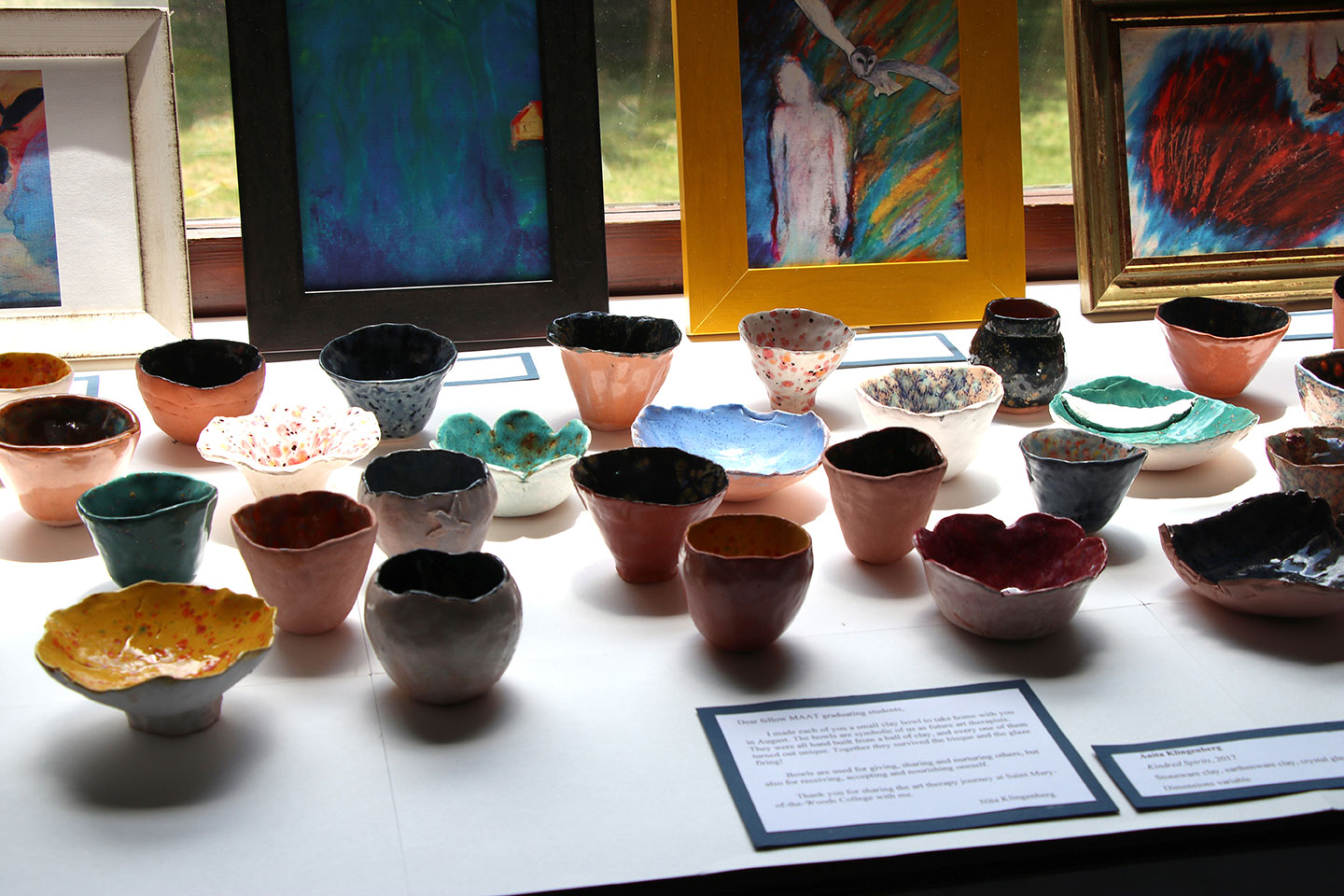
MAAT Curriculum
Focus on art media, creativity and spirituality.
The MAAT courses are designed to meet the American Art Therapy Association standards and the Art Therapy Credentials Board registration guidelines.
Accreditation
The Master of Arts in Art Therapy with an emphasis in Counseling is accredited by the Commission on Accreditation of Allied Health Education Programs (www.caahep.org) upon the recommendation of The Accreditation Council for Art Therapy Education.
Commission on Accreditation of Allied Health Education Programs
9355 – 113th St. N, #7709
Seminole, FL 33775
727-210-2350
www.caahep.org
Graduate Program in Art Therapy Mission Statement
The Master of Arts in Art Therapy with an Emphasis in Counseling (MAAT) program at Saint Mary-of-the-Woods College (SMWC) is dedicated to educating men and women, both personally and professionally, for their roles as conscientious art therapists. The MAAT program integrates the mission of the American Art Therapy Association, Inc. (AATA) in promoting the belief that the creative art making process is healing and life enhancing.
The implementation of the hybrid learning format coincides with the mission and vision of Saint Mary-of-the-Woods College, which prepares students for service and leadership roles in a diverse and global society.
The Master of Arts in Art Therapy with an Emphasis in Counseling program and constituents, value the spirituality of the Sisters of Providence, and are dedicated to providing a quality education that is based on excellence and integrity. The MAAT program is a diverse community of learners who share the pursuit of knowledge and social justice.
Program Goals
The goal of the Master of Arts in Art Therapy with an Emphasis in Counseling (MAAT) program is to educate students on theory and techniques that facilitate culturally and trauma informed practices within art therapy and counseling including use of creativity through art media for emotional, psychological, and spiritual growth.
- To provide instruction, experience, and resources for students according to the educational guidelines for art therapy education programs through the CAAHEP.
- To foster the student’s ability to integrate theories of art therapy, counseling, and psychopathology as related to the therapeutic self.
- To foster the student’s development of appropriate art therapy and counseling skills utilized in treatment.
- To foster independent learning, critical thinking and the ability for the student to articulate their own meaning of art therapy.
- To foster a community of learning and mutual support during and after the residencies.
Learning Outcomes
Students graduating from the art therapy degree program will be able to:
- Integrate knowledge of historical foundations of art therapy and counseling theory and techniques into practical contemporary professional practice of art therapy as evidenced by coursework and, fieldwork evaluations.
- Distinguish therapeutic benefits of art therapy and counseling as applied to a variety of client bases for promoting growth and well-being as evidenced through fieldwork evaluations, and art process or therapeutic properties demonstrated in the final art exhibition. Elements of art therapy benefit include.
- Therapeutic properties and interventions within media application
- Recognition of imagery, symbolism and metaphor
- Therapeutic use of various art processes
- Apply analytical, evaluative, integrative, culturally and developmentally appropriate art therapy and counseling skills incorporating knowledge of diagnostic processes in accord with the current Diagnostic and Statistical Manual (DSM) and International Statistical Classification of Diseases and Related Health Problem (ICD) as evidenced by gateway assessment project and fieldwork evaluations.
- assessment,
- treatment planning and
- implementation skills
(these skills will reflect principles of human development including models of artistic and creativity, gender and sexuality, family life and psychopathology)
- Identify and respond to all professional circumstances including state licensing and credentialing criteria with appropriate ethical and legal knowledge and action in all levels of practice including the provision of treatment, conducting research, and advocacy as evidenced by fieldwork evaluations and final thesis review.
- Articulate and pursue an ever-evolving personal identity as an art therapist through the engagement of ongoing artmaking for personal growth and self-awareness while incorporating supervision and consultation in an effort to continually inform clinical practice in art therapy and in counseling. This will be evidenced by final art exhibit, final thesis and fieldwork evaluations.
- Develop appropriate and collaborative therapeutic relationships with clients, implement art therapy and counseling services that consider diverse values, beliefs and actions while realizing the impact of oppression, prejudice, discrimination, and privilege, and develop responsive practices that include collaboration, empowerment, advocacy and social justice as evidenced by fieldwork evaluations and the multicultural research project.
